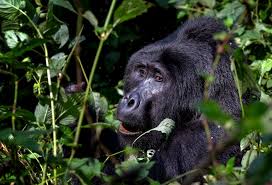The novel coronavirus sweeping the globe already jumped species, probably originating in bats and possibly infecting pangolins before hitting humans. Now primate scientists say they fear that the virus could pose a mortal threat to our closest living relatives — chimpanzees, gorillas and other great apes.
Source: The Washington Post
There is no evidence yet of great apes, all species of which are endangered, becoming infected with the virus that causes covid-19 in humans. But in a letter published Wednesday in Nature, 25 disease researchers, conservationists and other experts note the primates are susceptible to human respiratory diseases, sometimes fatally. Viruses, some of which have been traced to humans and cause just mild symptoms in people, have sickened and killed apes in several African countries.
“We’re most concerned because we’ve seen these major mortality events linked to respiratory diseases from humans that cause minor illness in humans,” Thomas Gillespie, a disease ecologist at Emory University and a lead author of the letter, said in an interview. “Apes are endangered primarily because of habitat loss and poaching, and more and more we’re seeing that disease is becoming an important co-factor in their endangerment.”
The letter called on countries with wild ape populations to consider suspending wildlife tourism and reducing field research, though Gillespie said sites may need additional funding to ensure essential staff remain on the ground to prevent other threats to apes: poaching and deforestation.
Some countries, including Gabon and Rwanda, have already suspended tourism, and widespread border closures and flight cancellations have dramatically reduced international travel. But a primary concern, Gillespie said, is that cheaper flights and lower access fees to spots that are still open may entice younger travelers — who are more apt to hike into the wilderness to see great apes and are also more likely to have mild symptoms if infected with covid-19.
A March 15 statement from the International Union for the Conservation of Nature “strongly” advises that no humans come within 10 meters, or about 33 feet, of great apes in the wild. It also recommends that no person who has been sick or who has been in close contact with sick people in the previous 14 days be allowed to visit great-ape sites. Previously, that guidance was capped at seven days, Gillespie said.
“This pandemic is distinct. We need a longer quarantine,” Gillespie said. “We’re concerned that we’re going to have people with mild symptoms who are going to be infectious prior to showing symptoms.”
The letter is also directed at zoos and sanctuaries that keep great apes, said Dominic Travis, an associate professor at the University of Minnesota’s College of Veterinary Medicine and co-author of the letter. Staff at those facilities have typically been prepared to cope with disease outbreaks and threats, both at refuges in Africa and at well-funded Western zoos, where he said exhibits are often designed to keep human pathogens out. That doesn’t mean all have the resources to deal with this pandemic, he said.
“There is a direct threat from this virus. We don’t know how big that threat is, but we know it exists. And that’s what this letter is about. This letter says, ‘Hey, all ape people: Pay attention,’ ” said Travis, who studies wildlife epidemiology and veterinary public health. “Can apes get this coronavirus? There’s a lot of evidence in the virus itself that says probably. … Do we need more evidence to be careful? Probably not.”
Source: The Washington Post

































Leave a Comment
You must be logged in to post a comment.